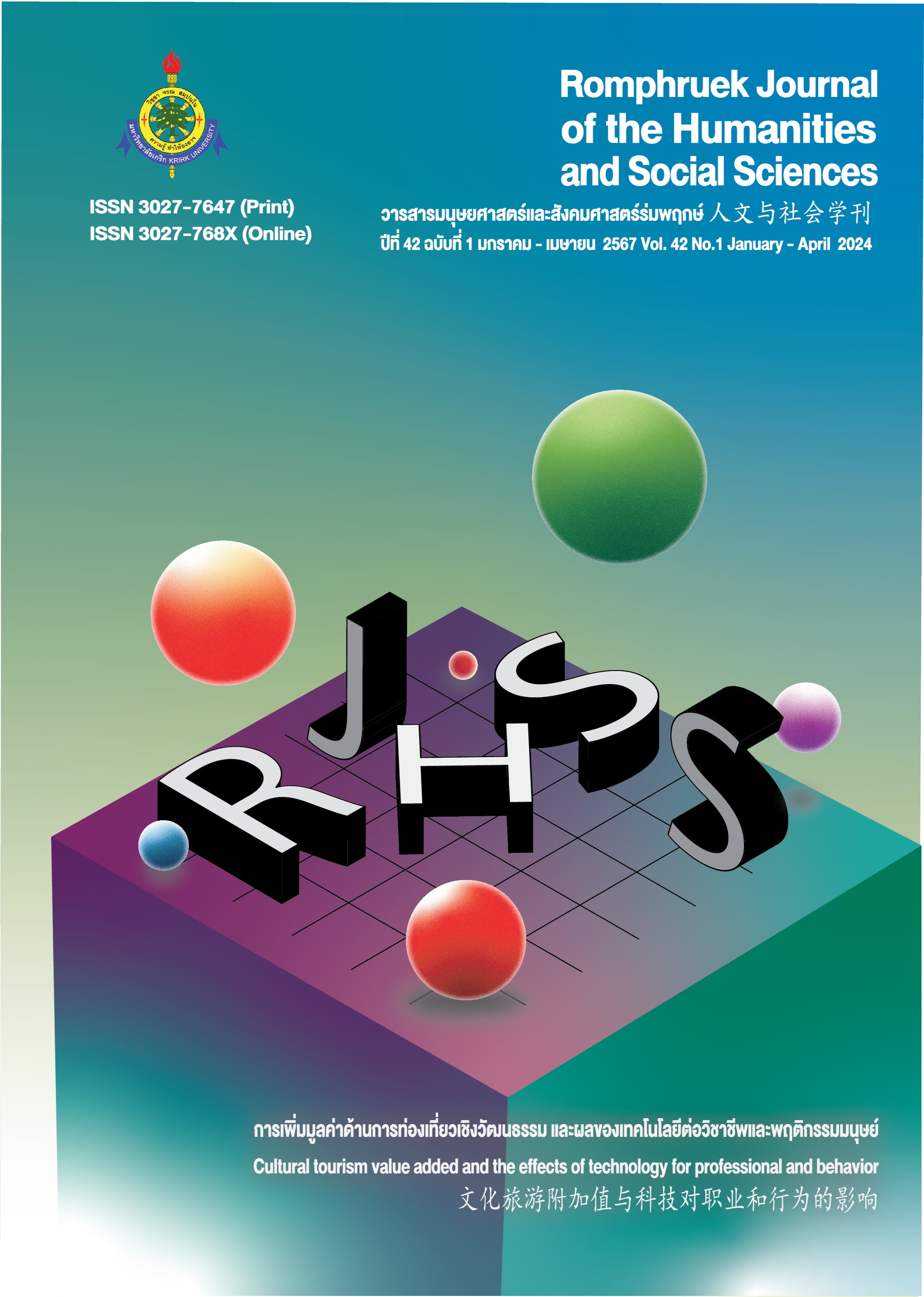การตลาดดิจิทัลที่มีอิทธิพลต่อพฤติกรรมและการตัดสินใจซื้อสินค้า หนึ่งตำบลหนึ่งผลิตภัณฑ์ (OTOP) จังหวัดนนทบุรี
Main Article Content
บทคัดย่อ
การวิจัยครั้งนี้มีวัตถุประสงค์เพื่อศึกษา 1) การตลาดดิจิทัลที่มีอิทธิพลต่อพฤติกรรมการซื้อสินค้าหนึ่งตำบลหนึ่งผลิตภัณฑ์ จังหวัดนนทบุรี 2) การตลาดดิจิทัลที่มีอิทธิพลต่อการตัดสินใจซื้อสินค้าหนึ่งตำบลหนึ่งผลิตภัณฑ์ จังหวัดนนทบุรี ใช้แบบสอบถามเป็นเครื่องมือในการวิจัย มีค่าความเชื่อมั่น เท่ากับ 0.92 ขนาดกลุ่มตัวอย่าง 400 คน สถิติที่ใช้ได้แก่ ค่าเฉลี่ย ส่วนเบี่ยงเบนมาตรฐาน และการวิเคราะห์สมการถดถอยพหุ ผลการวิจัยพบว่า 1) การตลาดดิจิทัลมีอิทธิพลต่อพฤติกรรมการซื้อสินค้าหนึ่งตำบลหนึ่งผลิตภัณฑ์ จังหวัดนนทบุรี อย่างมีนัยสำคัญทางสถิติที่ระดับ .01 ตัวแปรอิสระคือ การตลาดดิจิทัล ประกอบด้วย สื่อสังคมออนไลน์ เว็บไซต์ การครองหน้าแรก การตลาดเชิงเนื้อหา และจดหมายอิเล็กทรอนิกส์ ตามลำดับ สามารถอธิบายความผันแปรของตัวแปรตาม คือ พฤติกรรมการซื้อผลิตภัณฑ์โอทอป ได้ร้อยละ 60.2 2) การตลาดดิจิทัลมีอิทธิพลต่อการตัดสินใจซื้อสินค้าหนึ่งตำบลหนึ่งผลิตภัณฑ์จังหวัดนนทบุรี อย่างมีนัยสำคัญทางสถิติที่ระดับ .01 ตัวแปรอิสระคือ การตลาดดิจิทัล ประกอบด้วย สื่อสังคมออนไลน์ เว็บไซต์ การตลาดเชิงเนื้อหา การครองหน้าแรก และจดหมายอิเล็กทรอนิกส์ ตามลำดับ สามารถอธิบายความผันแปรของตัวแปรตาม คือ การตัดสินใจซื้อสินค้าหนึ่งตำบลหนึ่งผลิตภัณฑ์ ได้ร้อยละ 45.3
Article Details

อนุญาตภายใต้เงื่อนไข Creative Commons Attribution-NonCommercial-NoDerivatives 4.0 International License.
ทุกบทความที่ตีพิมพ์ในวารสารมนุษยศาสตร์และสังคมศาสตร์ร่มพฤกษ์เป็นทัศนะและข้อคิดเห็นของผู้เขียนมิใช่ทัศนะของมหาวิทยาลัยเกริกหรือกองบรรณาธิการ การนำบทความส่วนใดส่วนหนึ่งหรือทั้งหมดไปพิมพ์เผยแพร่ต้องอ้างอิงที่มาให้ชัดเจน
เอกสารอ้างอิง
กาญจนา ธรรมสา. (2563). พฤติกรรมการตลาดแบบดิจิทัลที่ส่งผลต่อการตัดสินใจซื้อสินค้า OTOP ประเภทเสื้อผ้า และเครื่องแต่งกายของบุคลากรองค์กรบริหารส่วนจังหวัดเชียงราย (วิทยานิพนธ์ปริญญามหาบัณฑิต ไม่ได้ตีพิมพ์). มหาวิทยาลัยรามคำแหง.
กตัญญุตา โอเช่ และ สุวัฒนา ตุ้งสวัสดิ์. (2565). การตลาดดิจิทัลที่ส่งผลต่อพฤติกรรมการซื้อสินค้าออนไลน์ของผู้บริโภคในกลุ่มจังหวัดนครชัยบุรินทร์. วารสารวิชาการเทคโนโลยีการจัดการ, 3(1), 57-70.
กศิพัฎญ์ ทองแกม และ โฆสิต แพงสร้อย. (2562). ปัญหาและแนวทางส่งเสริมการขายสินค้าโอทอปบนตลาดออนไลน์เชิงพุทธในจังหวัดอุดรธานี. วารสารมหาจุฬานาครทรรศน์. 6(9), 4627-4643.
จันทนา ทิมทอง. (2564). นวัตกรรมผลิตภัณฑ์และการตลาดดิจิทัลที่ส่งผลต่อการตัดสินใจซื้อสินค้าโอทอปของผู้บริโภคในจังหวัดชุมพร (วิทยานิพนธ์ปริญญามหาบัณฑิต, สถาบันเทคโนโลยีพระจอมเกล้าเจ้าคุณทหารลาดกระบัง). ThaiLIs. https://tdc.thailis.or.th/tdc/basic.php
ชนินทร์ มหัทธนชัย บุษราภรณ์ มหัทธนชัย ทิวาวัลย์ ต๊ะการ จิตราภรณ์ ธาราพิทักษ์วงศ์ ชัยทัศน์ เกียรติยากุล และ มานพ ชุ่มอุ่น. (2561). การพัฒนาระบบดิจิทัลคอมเมิร์ซเพื่อส่งเสริมการตลาดของผลิตภัณฑ์หนึ่งตำบลหนึ่งผลิตภัณฑ์ (OTOP) อำเภอแม่ริม จังหวัดเชียงใหม่. (งานวิจัย,มหาวิทยาลัยราชภัฏเชียงใหม่ และสำนักงานคณะกรรมการวิจัยแห่งชาติ)
ธนิดา อัศวโยธิน. (2561). การตลาดออนไลน์ที่มีผลต่อพฤติกรรมการซื้อสินค้าออนไลน์ของผู้บริโภคในเขตอำเภอเมือง จังหวัดนครราชสีมา (วิทยานิพนธ์ปริญญามหาบัณฑิต ไม่ได้ตีพิมพ์). มหาวิทยาลัยรามคำแหง.
พรพิมล สัมพัทธ์พงศ์. (2559). พฤติกรรมและความพึงพอใจของผู้บริโภคที่มีต่อผลิตภัณฑ์สินค้าหนึ่งตำบลหนึ่งผลิตภัณฑ์ (OTOP) ในเขตอำเภอบางกรวย จังหวัดนนทบุรี. วารสารบัณฑิตศึกษา มหาวิทยาลัยราชภัฏวไลยอลงกรณ์ ในพระบรมราชูปถัมภ์, 10(1), 62-71.
พรพรรณ ตาลประเสริฐ. (2559). อิทธิพลของการตลาดแบบดิจิทัลต่อการตัดสินใจซื้อของผู้บริโภคกลุ่มธุรกิจการพาณิชย์อิเล็กทรอนิกส์ในเขตจังหวัดกรุงเทพมหานคร (วิทยานิพนธ์ปริญญามหาบัณฑิต, มหาวิทยาลัยกรุงเทพ). http://dspace.bu.ac.th/bitstream/123456789/2865/1/pornphan_tarn.pdf
มาร์เก็ตติ้งอุปส์. (2562, 5 กันยายน). 3 จุดอ่อน “OTOP ไทย” กับ 5 เคล็ดลับความสำเร็จ 20 แบรนด์ไทยไม่แพ้ชาติใดในโลก. https://www.marketingoops.com/reports/industry-insight/ decoding-the-success-of-thai-local-brand/
เศรษฐวิฐฬ์ คงกะพันธ์ และ วลัยลักษณ์ บวรสินรักดี. (2565). พฤติกรรมการซื้อสินค้าออนไลน์ของผู้บริโภคสูงอายุ จังหวัดภูเก็ตในยุคดิจิทัล. วารสารรัชต์ภาคย์, 16(47), 273-286.
สุภกร ตันวราวุฒิชัย และ บุญไทย แก้วขันตี. (2564). ปัจจัยการตลาดแบบดิจิทัล การโฆษณาผ่านสื่อสังคมออนไลน์และความสามารถด้านโลจิสติกส์ที่ส่งผลต่อการตัดสินใจซื้อสินค้าผ่านช่องทางพาณิชย์อิเลคทรอนิกส์ของผู้บริโภคในกรุงเทพมหานคร. วารสารเกษตรศาสตร์ธุรกิจประยุกต์, 15(22), 23-40.
สำนักงานพัฒนาธุรกรรมทางอิเล็กทรอนิกส์. (2564, 14 ตุลาคม). ETDA คาด อีคอมเมิร์ซไทยปี 64 พุ่งสูงถึง 4.01 ล้านล้านบาท. https://www.mcot.net/view/8CwbihJv
สำนักส่งเสริมภูมิปัญญาท้องถิ่นและวิสาหกิจชุมชน. (2564, 1 มิถุนายน). รายงานหนึ่งผลิตภัณฑ์หนึ่งตำบล.
https://otop.cdd.go.th/report#.
สำนักส่งเสริมภูมิปัญญาท้องถิ่นและวิสาหกิจชุมชน. (2563, 28 พฤษภาคม). การตลาด. https://cep.cdd.go.th/otop-data/.
อินไซต์เอาท์สตอรี. (2562, 28 กรกฎาคม). ชวนเที่ยวงาน OTOP "อัตลักษณ์เมืองนนท์" ณ โรบินสัน ไลฟ์สไตล์ สมุทรปราการ. http://www.insightoutstory.com/2019/08/otop-28.html
Abdel Fattah AL-AZZAM & Khaled AL-MIZEED. (2021). The Effect of Digital Marketing on Purchasing Decisions: A Case Study in Jordan. Journal of Asian Finance, Economics and Business. 8(5), 455–463.
Black, K. (2006). Business statistics for contemporary decision marking (4th ed.). John wiley & Sons.
Chaffey, D. (2013, December 18). Definitions of E-marketing vs Internet vs Digital marketing. https://www.smartinsights.com/digital-marketing-strategy/online-marketing-mix/definitions-of-emarketing-vs-internet-vs-digital-marketing/
Cochran, W.G. (1977). Sampling Techniques (3rd ed.). John Wiley and Sons Inc.
Flom, J. (2011, September 7). The Value of Customer Journey Maps: A UX Designer’s Personal Journey. https://www.uxmatters.com/mt/archives/2011/09/the-value-of-customer-journey-maps-a-ux-designers-personal-journey.php
Hair J.F., Black W.C., Babin B.J., Anderson R.E. & Tatham R.L. (2006). Multivariate data analysis (6th ed.). Pearson Prentice Hall
Hartemo, M. (2016). Email marketing in the era of the empowered consumer. Journal of Research in Interactive Marketing, 10(3), 212-230.
Kaur, G. (2016). Social Media Marketing. Asian Journal of Multidisciplinary Studies, 4(6), 34-36.
Kerlinger, F. (1972, April 3-7). The Study and Measurement of Values and Attitudes. (Paper presented). At the American Educational Research Association, Chicago, Illinois. https://eric.ed.gov/?id=ED079618
Kotler, P. (2017). Marketing 4.0: Moving from Traditional to Digital. John Wiley & Sons, Inc.
Kotler, P & Armstrong, G. (2013). Principles of Marketing (15th ed.). Pearson Prentice Hall.
Kotler, P. & Keller, K. L. (2014). Marketing Management (15th ed.). Pearson Education.
Kotler, P. & Keller, K. L. (2016). Marketing Management (15th global ed.). Pearson Education.
Kruenium, P. (2006). Learn to create computer-assisted lessons (CAI) with Authorware 7 novice
(1st ed.). IDC Infographic Center.
Nosko, A., Wood, E., & Molema, S. (2010). All About me: Disclosure in Online Social Networking Profiles: The Case of FACEBOOK. Computers in Human Behavior, 26(3), 406-418.
Pulizzi, J. (2014). Epic content marketing: how to tell a different story, break through the clutter, and win more customers by marketing less. McGraw-Hill.
Rodney Graeme Duffett. (2017). Influence of social media marketing communications on young consumers’ attitudes. Young Consumers, 18(1), 19-39
Rovinelli, R. J., & Hambleton, R. K. (1977). On the use of content specialists in the assessment of criterion-referenced test item validity. Tijdschrift voor Onderwijs research, 2(2), 49–60.
Sezgin, E., & Yildirim, S. O. (2016). Trends of factors and theories in health information systems acceptance: 2002-2014 Review. IGI Global.
Stankevich, A. (2017). Explaining the Consumer Decision-Making Process. Journal of International Business Research and Marketing, 2(6), 7-14.
Walid, I., Dojanah, M., & Sulaiman, A. (2016). The impact of social media as a marketing tool on purchasing decisions (Case study on Samsung for electrical home appliances). International Journal of Managerial Studies and Research (IJMSR), 4(1), 14-28.


